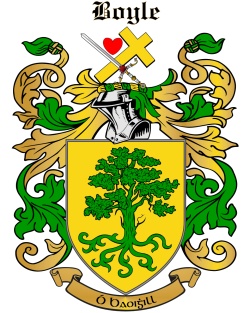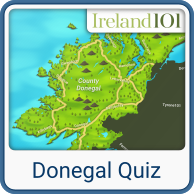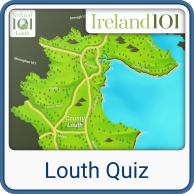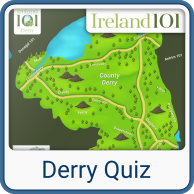98,197 Boyle Members around the world.
See one of our recent Ireland101 Tribe Gatherings
Boyle Family History
Ó Baoighill- anglicised Boyle, O Boyle. The root word is probably 'pledge'. Woulfe ('Sloinnte Gaedheal is Gall', 1923) says it is 'beaoithgheall' meaning 'vain-pledge', but MacLysaght ('Irish Families', 1985) says that modern scholars discount this, and gives the possible root as 'baigell' or 'profitable pledges'.
Most anciently of Co Donegal, the O Boyles were chiefs of the three Tuaths (OIr. meaning 'country, tribe' &c) in north-west Donegal. When this territory was overrun by the MacSweeneys, the Scottish-Gaelic mercenaries known as 'Gallóglach' or Galloglass, they removed to Tír-Ainmhearach in west Donegal,which became known as Críoch Bhaoigheallagh or O Boyle's Country. The Barony of Boylagh is taken from this territorial name.
Ethnically they belong to the Cineál Chonaill, kin to the O Dohertys, Gallaghers &c, and descend from Conal Gulban, a son of Niall Noígíallach or 'Niall of the Nine Hostages'. The vicissitudes of history, particularly the English onslaughts of the Elizabethan period in the late 16th century, have sent offshoots throughout Ireland; they were still in modern times, however, to be found mainly in the north, with highest numbers in their original Donegal homeland.
In the 1659 'Census' of Sir William Petty, the name is found as a 'Principal Irish Name' in the following counties:
Co Donegal
(Barony of) Tirhugh, O Boyle, 11 (families); Boylagh & Banagh, O Boyle, 41, plus Teage & Torloagh O Boyle are listed as 'titulados' or gentlemen in that barony; Raphoe, O Boyle, 7, plus Robert Boyle is listed as a gentleman in that barony; KillMcCrennan Barony, O Boyle, 15; Enishowen (Inisowen), O Boyle, 8.
Cos Tyrone and Mayo are missing from the 'Census'.
Co Louth
Barony of Dundalk, O Boyle, 19; Atherdee, O Boyle &c, 13.
Co Antrim
Barony of Dunluce, Carey &c, O Boyle, 11.
Co Monaghan
O Boyle & Boyle, 9.
By the mid 19th century, and the compilation of Griffith's 'Primary Valuation' most Boyle households were found in counties Donegal (889 households), Louth (150), Derry (129), Tyrone (125), Armagh (122), Mayo (114) and Antrim (105). There were 2491 entries for Boyle in that survey, and 138 entries for O' Boyle (principally in Mayo, 92).
The Registrar General's 'Special Report...'(1909) based on the births' figures for 1890, lists most Boyle births in counties Donegal, Antrim, Mayo, Tyrone and Louth. Boyle was the third highest occuring surname in Co Donegal in that year.
Boyle is also a surname brought into Ireland by the English 'Adventurer' Richard Boyle in 1588. Born in Canterbury, Kent, he acquired estates in Co Waterford and Co Cork. He became Lord Treasurer of Ireland and was given the title Earl of Cork. His descendants were known as Earls of Cork and Orrery, and became well known for their learning. Virtually all of the Boyles listed in the 'Dictionary of National Biography' (Oxford), are of this Anglo-Irish family, including Robert Boyle (1627-1691) 'the father of modern chemistry'. I have seen the derivation of his name as Norman French De Binville. There are 32 Boyle households in Griffiths for Co Cork, and 11 for Co Waterford, although these would be ordinary householders of native Gaelic stock, rather than members of the Anglo-Irish family.
Boyle is also a Scottish name of Norman origin, viz. de Boyville; the origin is possibly the town of Bieville near Caen, although there were doubtless other similarly named places (Beauville) in Normandy. The De Boyvilles were settled in south west Scotland: Richard de Boyville was seigneur of the lands of Kelburn in Ayrshire in the late 13th century,and Henri de Boyville was keeper of the castle at Dumfries in 1296, and became very well known in Scottish history, Earls of Glasgow et al. It has been claimed by some genealogists that several of this family settled in northern Ireland, and therefore a significant number of Ulster Boyles are of this Norman stock. It may also be that Richard Boyle's family (originally of Hertfordshire) were a branch of these Norman/Scottish Boyles, and 'Binville' is a spelling error for 'Bieville'.
Whilst there may well have been some Scottish Boyles arriving with the plantations of the north in the early 1600s, the evidence in Petty's 1659 'Census' (above) indicates that Boyle in the north is a native 'Principal Irish Name'; in fact, I could find no certain examples of planter Boyles in the north of Ireland in that document, although it must be remembered that returns for Co Tyrone are missing. This point shows how important evidence is in names of dual or multiple origin.
The many Boyles in modern Scotland, most notably the Glasgow area, would contain a large proportion of (O) Boyle Irish immigrants.
Two Famous Boyles:
Richard Vicars Boyle (1822-1908) the railway engineer whose heroic defence of the Arrah Garrison in 1858 during the 'Indian Mutiny', where 50 men held off three thousand, earned him fame. He is reported to be of the Gaelic Boyles.
William Boyle (1853-1923) Co Louth man, playwright and writer. His plays, such as 'The Eloquent Dempsey' (1907), were performed at the Abbey Theatre in Dublin. He would be of the Gaelic clan.
The Boyle Gallery
You must be logged in to add to the gallery.
Missing Boyle Ancestors
Results from our ancestor database.
| Name | Birthplace | Born | Died |
|---|---|---|---|
| Catharine Boyle | Antrim, Ireland | 1800 | - |
| Patrick Boyle | Ireland | Unknown | - |




